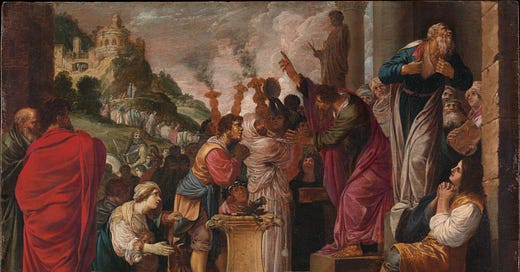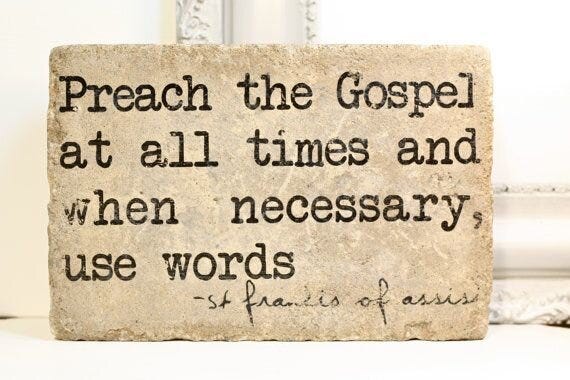I don't know about you, but I always thought after Paul's conversion at Damascus, he immediately went out and started preaching the Gospel to the Gentiles.
But he actually spent a lot of time studying the scripture and learning from the (other) apostles. It was only as other churches started popping up all over the place that Barnabas took him out into the Gentile world, which we see in today's first reading.
Reading 1
Acts 11:21b-26; 13:1-3
In those days a great number who believed turned to the Lord. The news about them reached the ears of the Church in Jerusalem, and they sent Barnabas to go to Antioch. When he arrived and saw the grace of God, he rejoiced and encouraged them all to remain faithful to the Lord in firmness of heart, for he was a good man, filled with the Holy Spirit and faith. And a large number of people was added to the Lord. Then he went to Tarsus to look for Saul, and when he had found him he brought him to Antioch. For a whole year they met with the Church and taught a large number of people, and it was in Antioch that the disciples were first called Christians.Now there were in the Church at Antioch prophets and teachers: Barnabas, Symeon who was called Niger, Lucius of Cyrene, Manaen who was a close friend of Herod the tetrarch, and Saul. While they were worshiping the Lord and fasting, the Holy Spirit said, “Set apart for me Barnabas and Saul for the work to which I have called them.” Then, completing their fasting and prayer, they laid hands on them and sent them off.
We really have Barnabas to thank for getting the ball rolling on spreading the Good News beyond Judaism. The reason it's significant that Antioch is where the Church started to be called Christians is simply this—up until this point, they were merely a weird sect of Judaism. It was the fact that they started to allow in Gentiles that marked them as something new and different.
Responsorial Psalm
Ps 98:1, 2-3ab, 3cd-4, 5-6
R. (see 2b) The Lord has revealed to the nations his saving power.
Sing to the LORD a new song,
for he has done wondrous deeds;
His right hand has won victory for him,
his holy arm.
R. The Lord has revealed to the nations his saving power.
The LORD has made his salvation known:
in the sight of the nations he has revealed his justice.
He has remembered his kindness and his faithfulness
toward the house of Israel.
R. The Lord has revealed to the nations his saving power.
All the ends of the earth have seen
the salvation by our God.
Sing joyfully to the LORD, all you lands;
break into song; sing praise.
R. The Lord has revealed to the nations his saving power.
Sing praise to the LORD with the harp,
with the harp and melodious song.
With trumpets and the sound of the horn
sing joyfully before the King, the LORD.
R. The Lord has revealed to the nations his saving power.
James Burton Coffman once said it was "tragic" that Israel never saw this Psalm as a call to bring God's word to the Gentiles. Paul and Barnabas clearly did, though, and we are the fruit of that insight.
Alleluia
Mt 5:16
R. Alleluia, alleluia.
Let your light shine before others
that they may see your good deeds and glorify your heavenly Father.
R. Alleluia, alleluia.
God’s word shed light, according to the Psalmist. Here, Jesus commands us to shine a light, as well, pointing toward God’s.
Gospel
Mt 5:13-16
Jesus said to his disciples: "You are the salt of the earth. But if salt loses its taste, with what can it be seasoned? It is no longer good for anything but to be thrown out and trampled underfoot. You are the light of the world. A city set on a mountain cannot be hidden. Nor do they light a lamp and then put it under a bushel basket; it is set on a lampstand, where it gives light to all in the house. Just so, your light must shine before others, that they may see your good deeds and glorify your heavenly Father."
The first metaphor makes sense to people who live in a cold part of the country. If you can’t use the salt to season your food, what good is it? For melting ice!1
I think most people get the whole “put your lamp on a lampstand” thing. Jesus doesn’t want us to be quiet about our faith. He wants us to live our lives in such a way that others will see, and in seeing us, see God.
Which does call to mind the classic line from St. Francis of Assisi—
Yes, there were parts of Judea that got cold enough to form ice on walkways.




